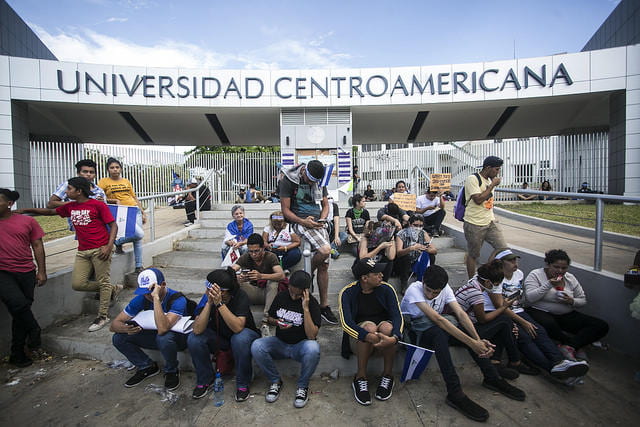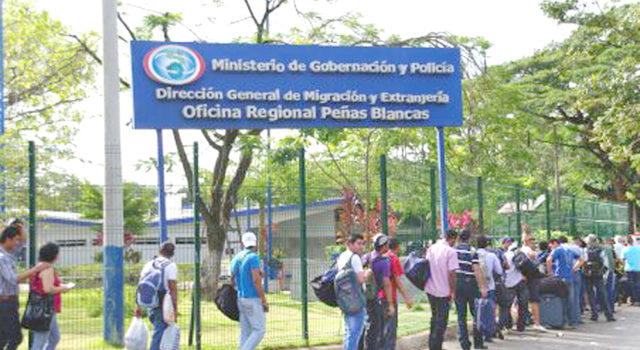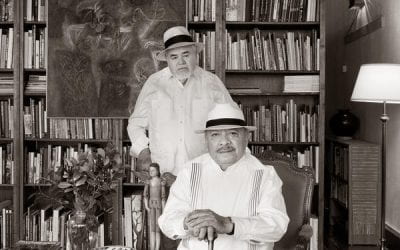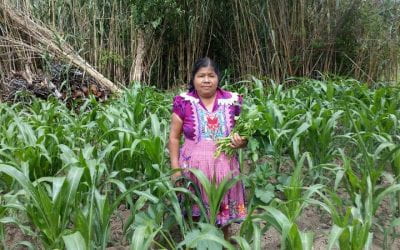Crisis and Caregiving
An Intergenerational Perspective on Aging and Migration
In December 2017, I visited Managua, Nicaragua, to give a public talk at the Universidad Centroamericana (UCA) about my recently published book, Care Across Generations: Solidarity and Sacrifice in Transnational Families. Managua is a sprawling capital city where directions are still given in relation to streets and other sites damaged by a major earthquake in 1972. The city was aptly called a “ciudad chaotic” by Dennis Rodgers (in a 2008 working paper entitled An Illness called Managua).
For the week of my visit, the city seemed memorably familiar—the UCA was in session; students walked to the nearby Metrocentro mall to hang out in the welcome air conditioning; taxis and buses swarmed to pick up waiting pedestrians, and everyday life seemed to have its typical, albeit somewhat chaotic, Managua rhythm. If there was tension in the air, I might have been oblivious to it, excited as I was to reconnect with several of the families who had participated in my research study about transnational migration and intergenerational care.
One of the families I spent time with during my 2017 visit was that of Norma, one of the 24 families in my original research study, the fieldwork for which I conducted in 2009-10. Norma’s daughter, María José, migrated to New York in the early 2000s with her sister Karla, leaving her son, Jeremy, in Norma’s care. Norma lives in Cuidad Sandino, on the outskirts of Managua, in a household compound shared by her older son, Michael, and his wife and two children. Norma’s younger son, Norman, also lives nearby with his wife and two children. Now in his early 40s, is a professional driver who drives for many non-governmental organizations (NGOs) and businesses operating in Nicaragua. I came to know him in 2004, while studying for my Masters in Public Health at UCLA, as he provided transportation for the health NGO I interned with; ever since then, Norman has provided my transportation when I visit Managua.
During my December 2017 visit, Norman took me to and from the UCA, family homes and other Managua locations. He described feeling that the city was on edge, with recent public protests by students and gay rights (LGBTQIA) organizations facing strong-armed police tactics. Civil society, including foreign NGOs, was expressing growing discontent about what they viewed as repressive government interference. Norman even reflected on what he would do if things got worse, wondering how he would make a living, and where he might go in order to support his wife and two young children. He did not mention the option of his own migration, even though his two sisters have lived and worked in the United States for nearly two decades.
Perhaps because I was focused on my book talk and excited to reconnect with families from my research study, I was distracted and didn’t see how tense things were in Managua. I certainly did not foresee that, just a few months later, Nicaragua would be plunged into another cycle of political chaos, nor that Norman would be pushed to make the difficult decision to leave Nicaragua.
In my work, I seek to understand people’s experiences of migration and of aging within intergenerational and lifecourse perspectives. For me, this means considering the cumulative impacts of migration across generations on extended families and individual family members at any one point in time or historical moment. I also approach migration’s impacts on families through the lens of care, tracing how family members reconfigure care relations in response to migration and how intergenerational caregiving can sustain transnational families. Such an approach situates Norman’s decision to migrate in response to Nicaragua’s recent political turmoil both in the context of historical legacies of political violence and outmigration in the country and of his family’s experiences with migration across generations.
This intergenerational approach views migration more widely than the decisions of individuals, offering insights into the complicated emotional and interpersonal terrain navigated by members of transnational families over time. Further, an intergenerational approach reveals how people experience growing old in countries marked by high rates of outmigration like Nicaragua, where aging is associated with shifting relations of care, solidarity and sacrifice within transnational family relationships.
In Nicaragua, then, people’s responses to the current political crisis are refracted through memories and experiences of previous generations of political violence and conflict-induced migration. In other words, past historical events, such as the Somoza dictatorship and the Contra War, have a significant impact on family relations of solidarity and sacrifice, pushing families apart as some members emigrate, and yet also fostering new relations of care among those who stay in Nicaragua.
In this way, we can conceive of the influence of generations as cohorts (following Karl Mannheim’s 1972 “The Problem of Generations” in Essays on the Sociology of Knowledge, Routledge), who share collective experiences of socio-historical events and whose encounters with contemporary challenges are refracted through memories of these past experiences. Generations can also be considered in relation to social regeneration, revealing how childbearing and childrearing organize family relations of care and membership in and across generations (child/parent/grandparent) within networks of extended kin (see Jennifer Cole and Deborah Durham, Generations and Globalization: Youth, Age, and Family in the New World Economy, Indiana University Press, 2007).
In Care Across Generations, I examine the caregiving roles of Nicaraguan grandmothers who assume primary responsibility for raising children after mothers (usually, the grandmothers’ daughters) have migrated—mostly to Costa Rica, Panama, Spain and the United States. Although the concept of “the third age” has been critiqued in cross-cultural studies of aging (for example, see Jessica Greenberg and Andrea Muehlebach, “The Old World and its New Economy, 2007 in the previously mentioned Cole-Durham volume), the idea of “la tercera edad” as signifying membership in a grandparent generation (e.g. the “third generation,” defined in relation to the earlier life stages of childhood and parenthood) is nonetheless analytically useful and corresponds with how Nicaraguan grandmothers see themselves. Thus, my intergenerational analysis of transnational family life reveals migration’s impacts on families in the present, as relations of care are reconfigured across generational lines, from migrant mother to grandmother caregiver, and as family members’ responses to migration are infused with memories and meanings from the migratory experiences of past generations.
These women approach grandmothering as a practical enactment of their solidarity with their migrant daughters as a way for them to share in the sacrifice of transnational family life. In this intergenerational framing, mothers migrate, sacrificing physical presence with their children and families for the opportunity to work abroad and send money as remittances back to Nicaragua. Children of migrant mothers also share in the sacrifice of transnational family life, taking advantage of the educational opportunities afforded by remittances to study hard and do well in school. Grandmothers, for their part, sacrifice their desire for family co-presence, assuming primary caregiving for their grandchildren, thus enabling mothers to migrate but also sharing in the intergenerational sacrifice of migration.
It is through such a perspective that I am currently following several families from my research study, staying in touch primarily through the phone application WhatsApp, attempting to understand the intergenerational dynamics of migration and care as they play out over time and in the face of current crises. One of these families is that of Norma and Norman.
When I first met Norma in 2009, she was vibrant and full of life, thriving in her role as a primary caregiver for her grandson, Jeremy, whose mother María José had emigrated to the United States with her sister Karla about a decade prior. While her daughters’ departures had led Norma into an episode of what she described as depression, she had bounced back within a few months, recuperating her job as a legal assistant for the city of Managua and buoying her mood with the busy-ness of everyday caregiving for Jeremy (aged 10 at the time). Norma found pleasure and purpose in caring for Jeremy, assuming the role of his “mamá Norma,” mothering again for another generation.
In interviews with me in 2009-10, Norma reflected on her daughters’ migrations through the prism of her former husband’s migration a generation prior. Miguel, the father of Norma’s children, had been aligned with the Somoza regime. When the Sandinista revolutionary government seized power in 1979, Miguel fled, along with thousands of other Somocistas, for the United States. While his departure was difficult for Norma, who had to assume care for their four young children on her own, she still felt it was inevitable, a result of a shifting political climate. However, within one year of his departure, Miguel lost touch with Norma and their children, his remittances dropping off and his communication becoming infrequent. When María José and Karla left Nicaragua a generation later, largely in response to the economic insecurity of the neoliberal period in Nicaragua (from 1990-2006), Norma feared their migration would result in a similar abandonment of their family back home. This did not come to pass, however, as Norma’s daughters established themselves in the United States, gained steady employment and obtained legal residency, which enabled them to regularly send remittances to, and maintain contact with, Norma, even now, after nearly two decades of transnational family life.
In 2009, Norma and Jeremy were also anticipating his reunification with María José in New York. So ready were they for this eventuality, in fact, that Norma had secured all the necessary paperwork for Jeremy’s visa application, and they had even managed to find winter coats and boots for Jeremy in one of Managua’s many public mercados (markets). Although a 2010 interview at the U.S. Embassy in Managua failed to grant Jeremy’s visa, due to problems with the application on María José’s end; by 2012, Jeremy’s visa was authorized and he left Nicaragua to join his “mamá María” in the United States.
In December of that year, on a return visit to Managua, I found Norma visibly affected by Jeremy’s departure. Where she had once seemed vibrant, now her 60 years of life showed in the weariness of her expression and the solemnness of her voice. She missed Jeremy, she told me, but she had to sacrifice her own desire to be with her grandson for the sake of his reunification with María José. Mindful not to repeat the parent-child ruptures that her former husband’s migration had precipitated, Norma viewed her care for Jeremy as encompassing the ethos of sacrifice and solidarity that would sustain her transnational family across future generations.
Flash-forward to June 2018, as Nicaragua plunged into political chaos, Norman made the difficult decision to emigrate, like his sisters had two decades before. Managua was turning increasingly unsafe, with the frequent tranques, (human barricades of protestors) and curfews complicating mobility in the city and with increased violence at the hands of parastate actors known as turbas. Even the UCA had become a seat of political unrest, with student-faculty protests in April 2018 leading police to fire mortars directly onto campus. (A detailed account of the factors precipitating the current crisis can be found in the 2018 report of the Comisión Interamericana de Derechos Humanos.)
As the protests spread, economic activity ground to a halt and Norman could no longer find work as a driver. Many foreign companies have closed up and left Nicaragua—among them, the Costa Rican construction firm that had been among Norman’s key clients. One such client told Norman that, should he decide to leave, he would help him get settled in Costa Rica. Norman pondered that offer for weeks as his business dried up and it became increasingly difficult to support his family. Ultimately, with the help of María José (who sent money for airfare), Norman left Nicaragua with his wife and their two young children. In doing so, Norman joined the more than 40,000 Nicaraguans who have fled to Costa Rica since the current crisis began, most crossing by land and lacking legal residency status in Costa Rica. (While Norman and other Nicaraguans are technically eligible to apply for asylum status on the grounds of political persecution, the cost of legal resources for the process make it outside the reach of the majority of migrants from the neighboring country.)
In a recent conversation via WhatsApp, I asked Norman about his experience in Costa Rica. He recounted the difficulties he had obtaining work, finding housing and supporting his family. Frustrated by the impossibility of obtaining a drivers license as an undocumented migrant, Norman couldn’t work as a driver and instead drew on his personal connections with the former employer to find temporary work on a construction project. (I found it hard to imagine Norman, who would drive around Managua and environs in cleanly-pressed slacks and collared shirts, engaged in hard labor on a construction site.) Norman worked long, hard hours, returning at the end of the day exhausted to his wife, Azucena, and their children, but barely bringing home enough money to cover rent and food. To make matters worse, Norman’s six-year-old daughter was experiencing frequent bullying at her preschool and among peers on the basis of her nationality. Azucena became increasingly impatient with their situation and longed to return to her extended family in Managua. Norman wouldn’t even consider allowing her to do so without him, memories of his own father’s abandonment making family separation seem an impossible choice. Ultimately, the pressure was intolerable and, after six months in Costa Rica, Norman and his family returned to their home on the outskirts of Managua.
When I talked with Norman about his time in Costa Rica, I was curious how his mother had reacted to his migration experience. He told me that Norma reacted in her typical perfunctory manner, viewing his migration as a necessary response to political and economic insecurity—as she had similarly responded to her daughters’ and her husband’s migrations in the past. For his part, Norman considered his own troubled experience as an example of Nicaraguans’ historically complicated relationship with Costa Rica. On the one hand, Costa Rica offers a site of exile for Nicaraguans fleeing political violence now, just as it did during the 1980s, when tens of thousands of Nicaraguans sought shelter from the violence of the Contra War. At the same time, Nicaragüenses in Costa Rica face rampant discrimination, limiting their social and economic opportunities in the neighboring country. As he considers the ways in which political and familial histories repeat across generations, Norman is uncertain about his country’s and his family’a future, saying “no sé que va a pasar, no lo puedo saber” (I don’t know what’s going to happen, I can’t know.)
In thinking about Norman, Norma, and their transnational family, an intergenerational perspective reveals how migration experiences in the present refract past migratory episodes. In this sense, Norman’s trepidation about migrating reflects his fear of repeating a painful pattern of paternal abandonment that he experienced as a child after his father left for the United States. Norman tells me as much, emphasizing that “mi prioridad es mi familia, es ser padre para mis hijos” (“my priority is my family, is being a father for my children.”) At this stage of his life, as a parent/father, Norman considers the possibility of migration in relation to this primary goal of being a caregiver and economic provider for his family.
Of course, his considerations remain complicated as life remains hard (to use Roger Lancaster’s classic phrase about life in Nicaragua) and as Norman and other migrants and potential migrants must balance the need to economically provide for their families with their desires for physical copresence—an impossible balance, which constrains all migratory decisions. While I can not foresee the future for Norman and his family, just as I can not foresee Nicaragua’s political future, I do know that family relationships and responses to contemporary crises will continue to be understood through the prism of past experiences, for this is what an intergenerational perspective on migration and aging reveals.
All names of research participants herein are changed to protect individuals’ anonymity.
Winter 2019, Volume XVIII, Number 2
Kristin Elizabeth Yarris is an Associate Professor in the Department of International Studies at the University of Oregon, where she also Co-Directs the Center for Global Health and serves on the Dreamers Working Group. Her first book, Care Across Generations: Solidarity and Sacrifice in Transnational Families, was published in 2017 by Stanford University Press. Her research and teaching focus on transnational migration and global mental health.
Related Articles
Video Interview with Flavia Piovesan
Flavia Piovesan is a member of the Inter-American Commission on Human Rights, Professor of Law at the Pontifical Catholic University of São Paulo and 2018 Lemann Visiting Scholar at the…
Aging: Editor’s Letter
There is no smell of pungent printers ink permeating my office. My interns—Sylvie, Isaac and Marc—are not scrambling to find FedEx boxes to send out ReVista issues to authors and photographers all over the world. I cannot feel the silken touch of the printed page…
A Story of Agricultural Change
Francisca Hernández García, 92, lives in San Miguel del Valle, a town of around 3,000 inhabitants in the Central Valleys of Oaxaca, an hour east of the capital city. She is one of the few remaining…






